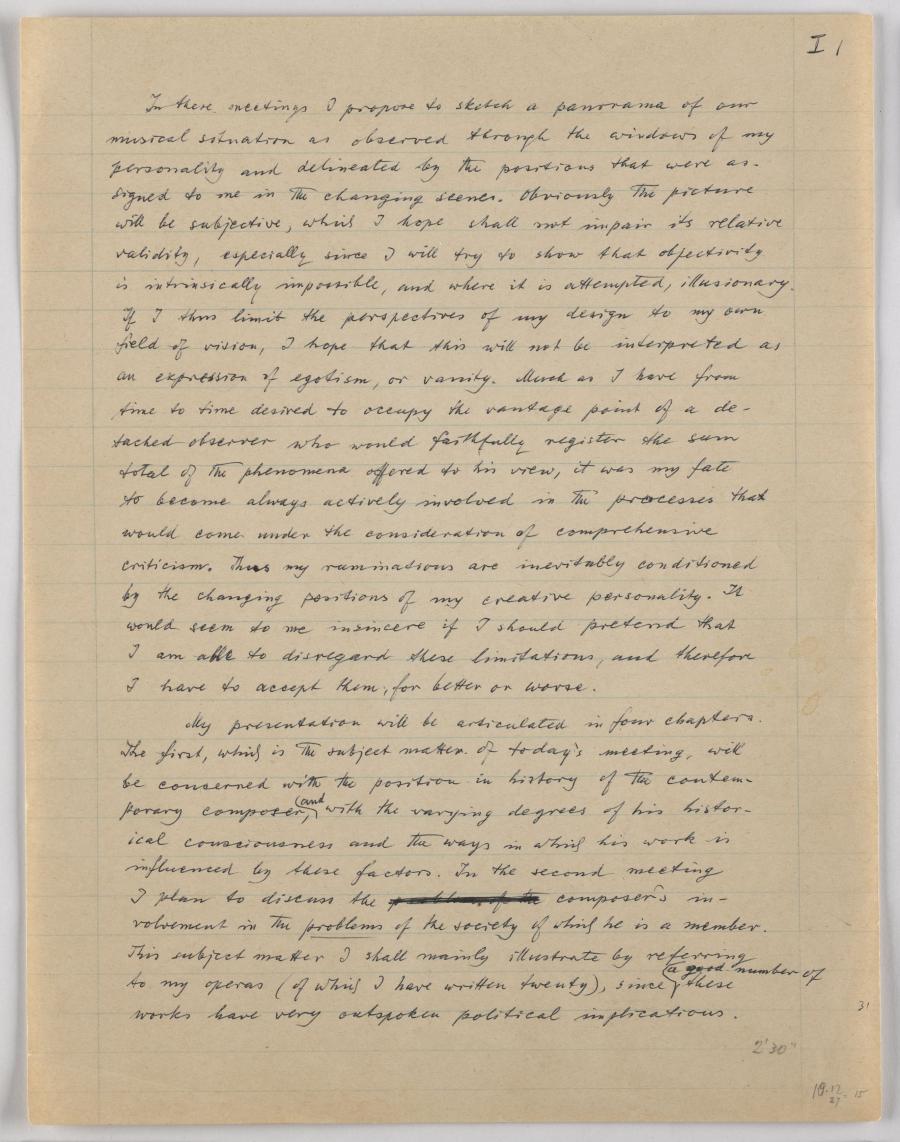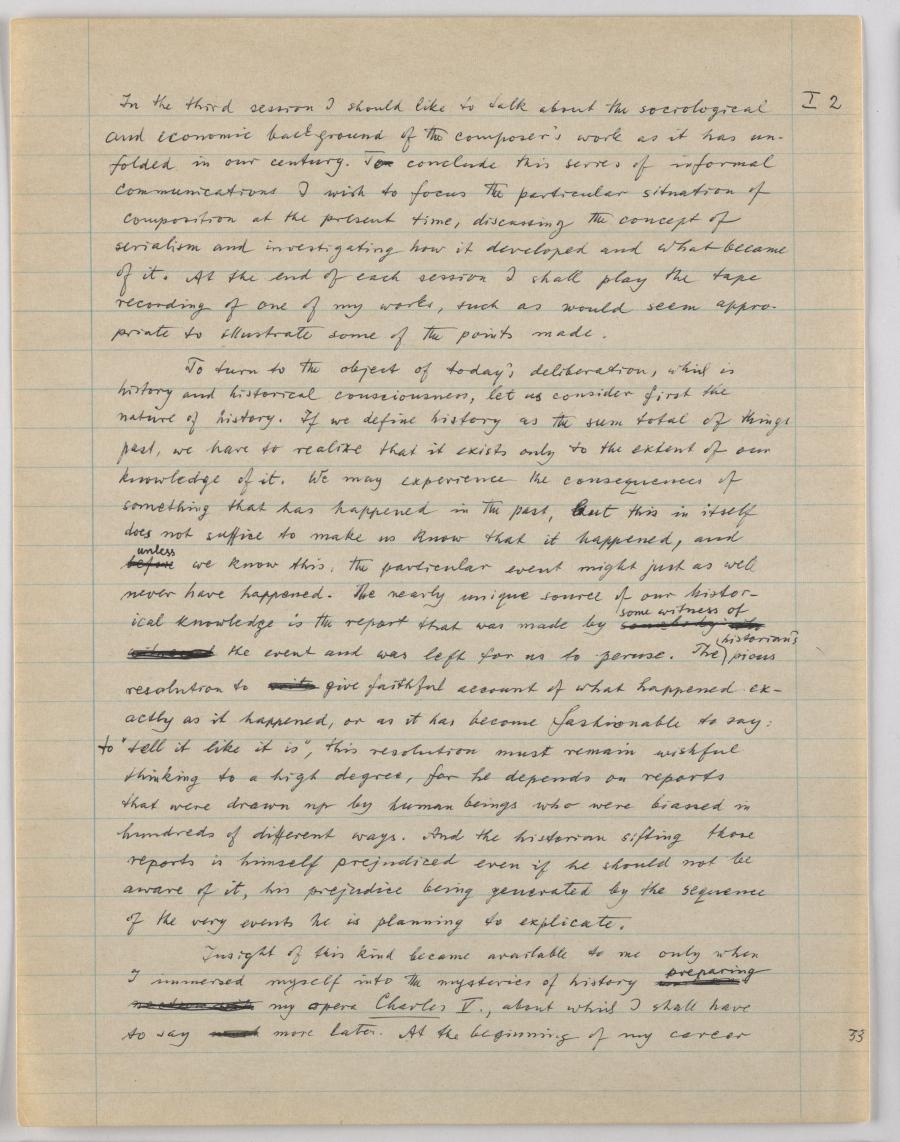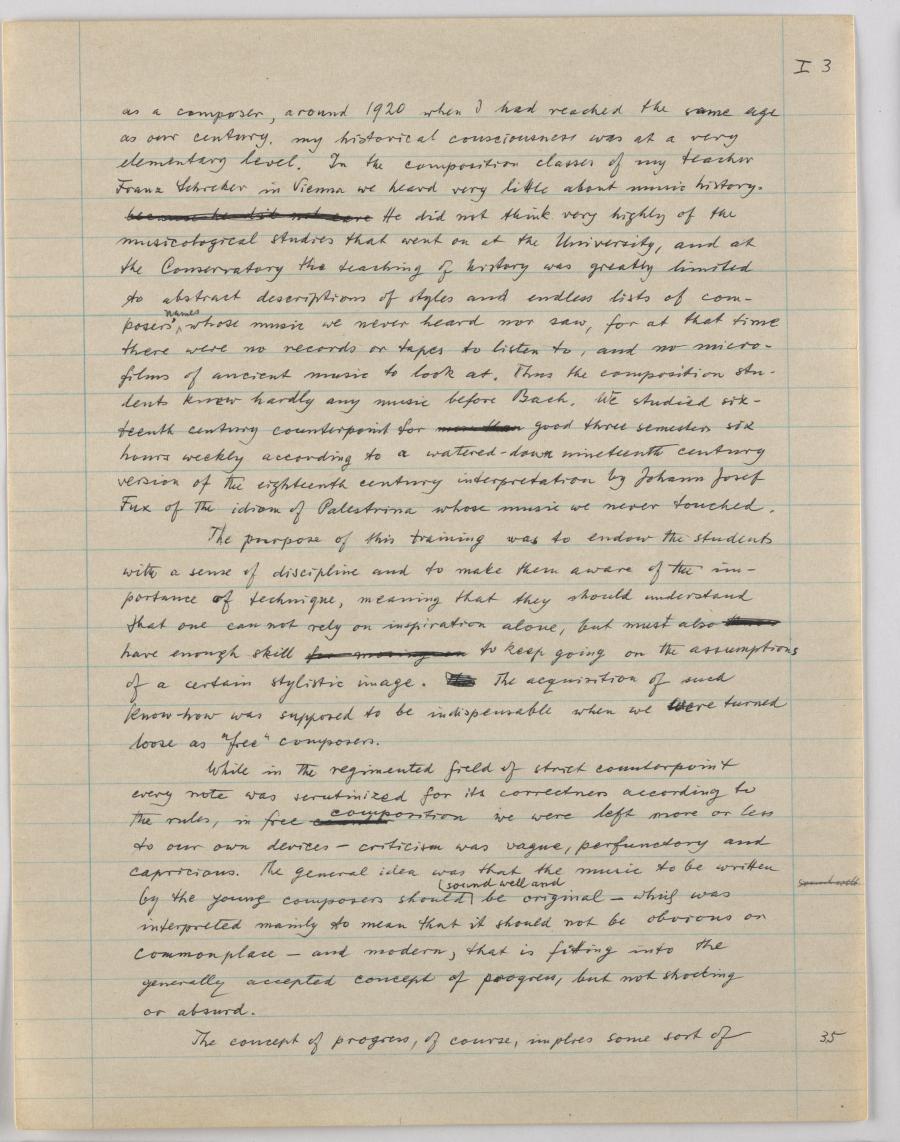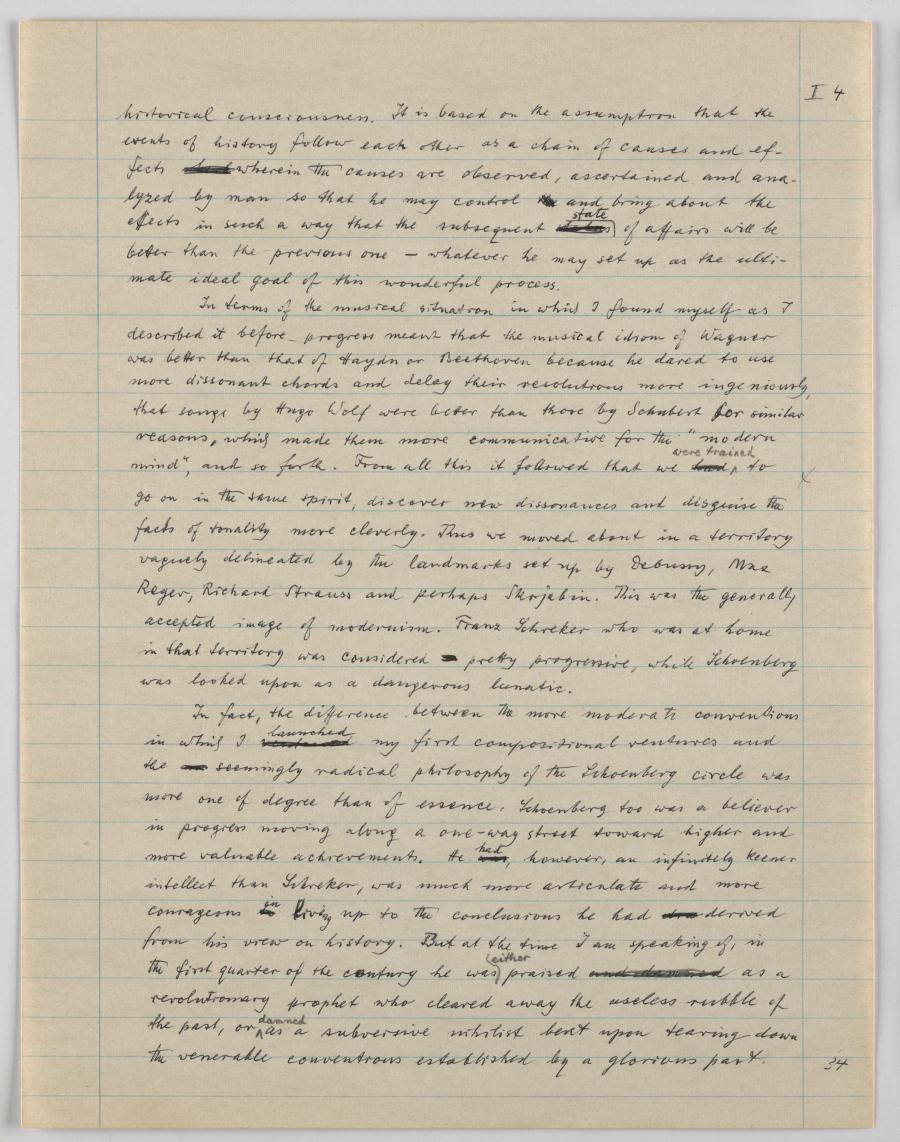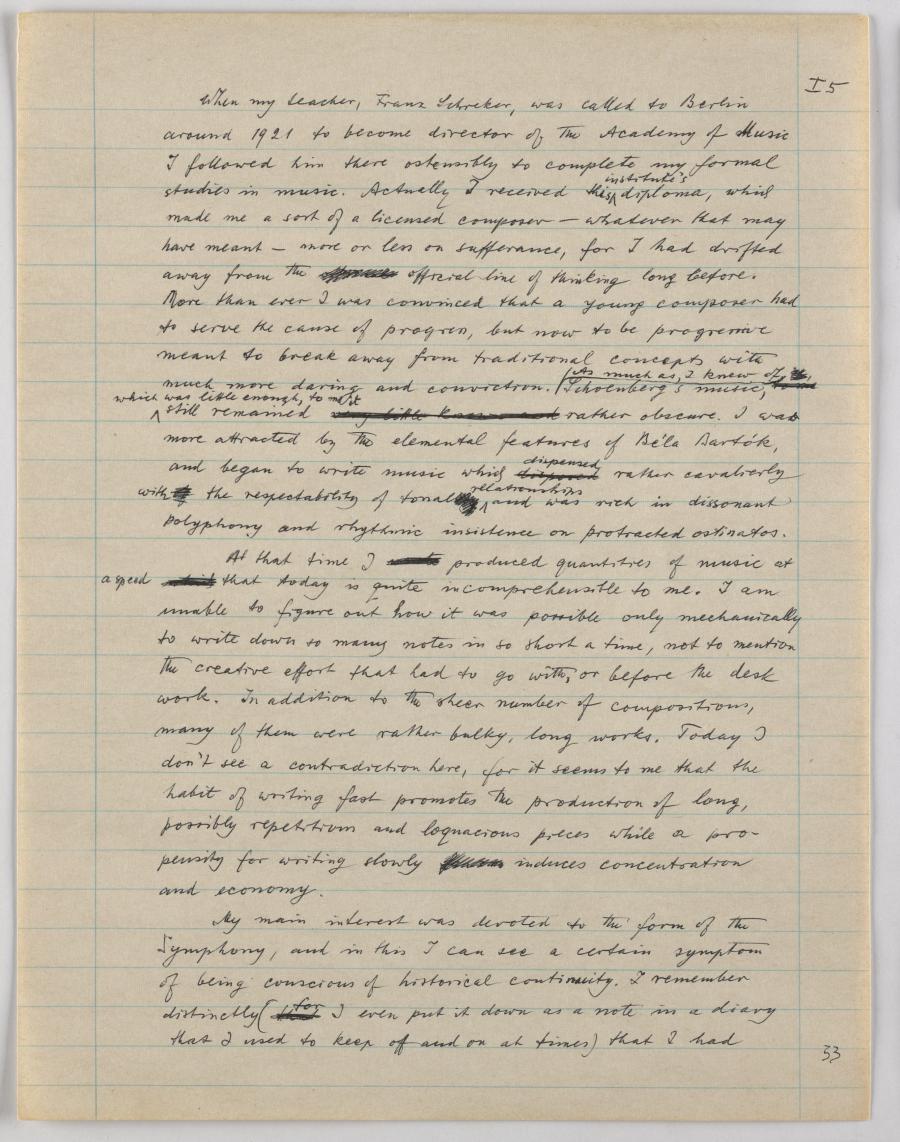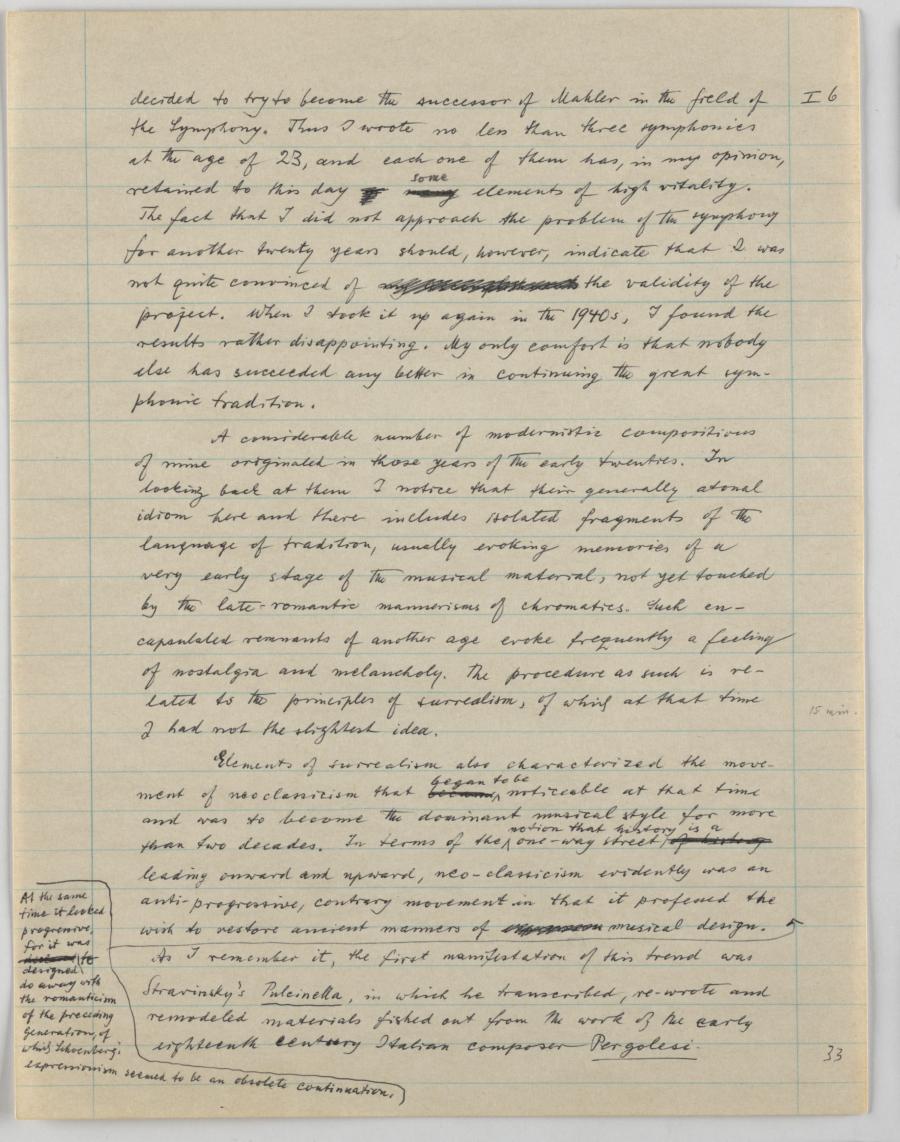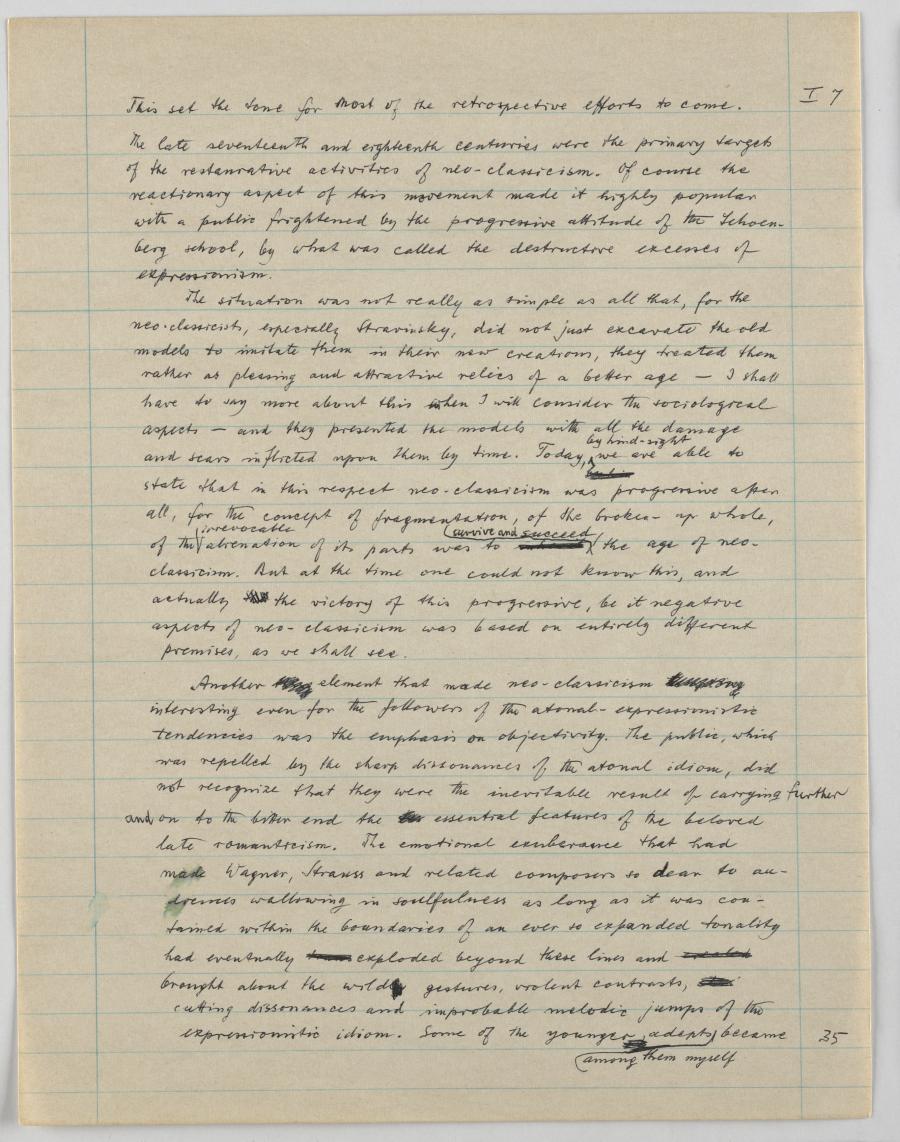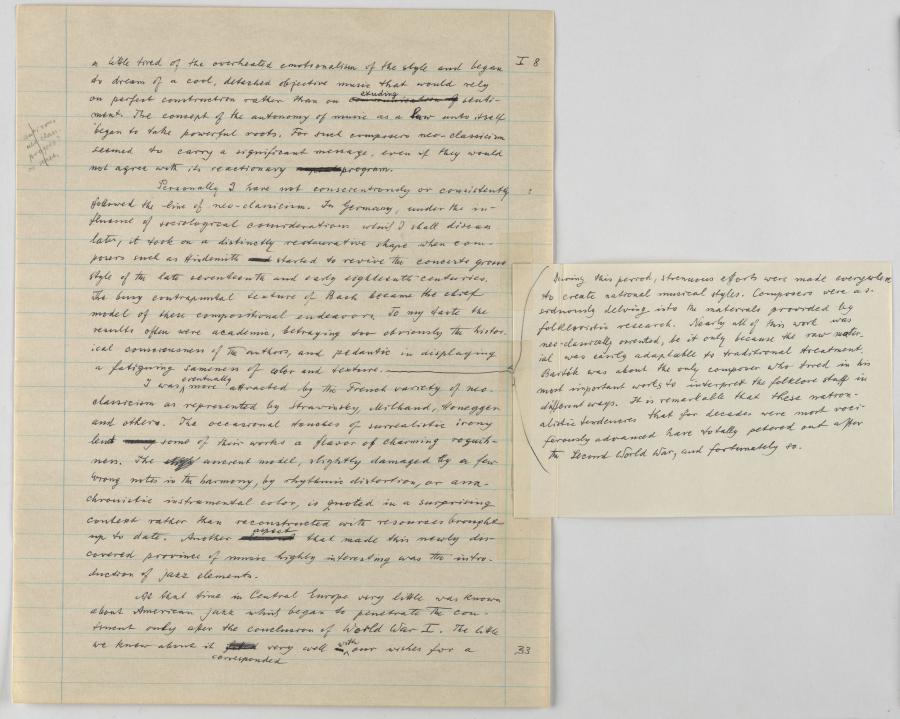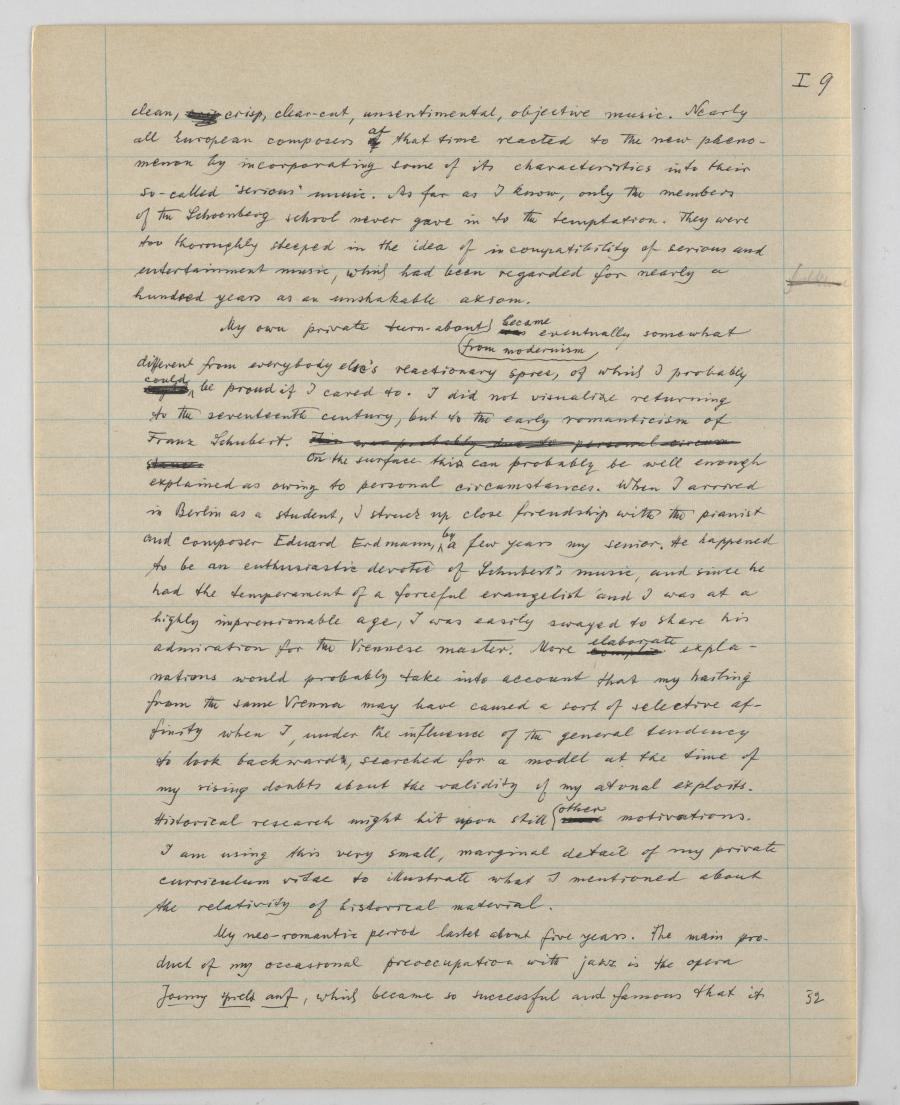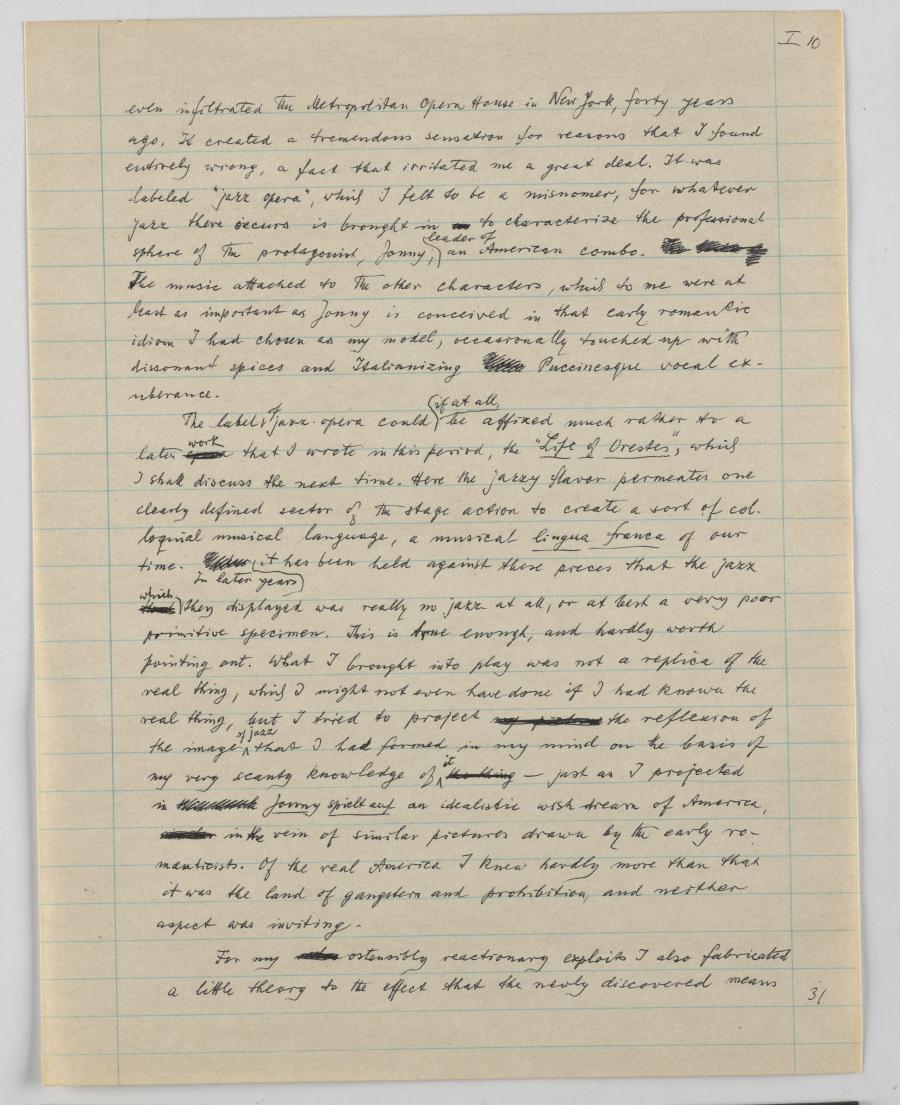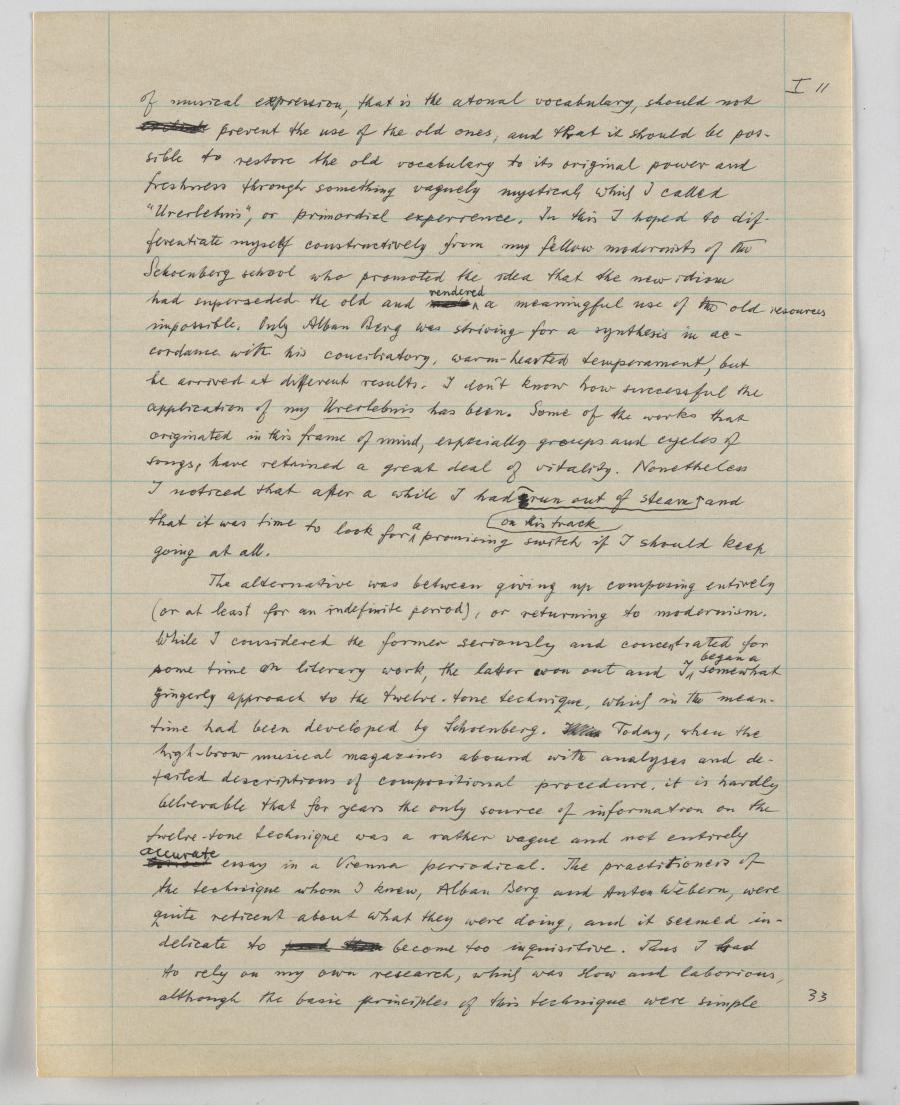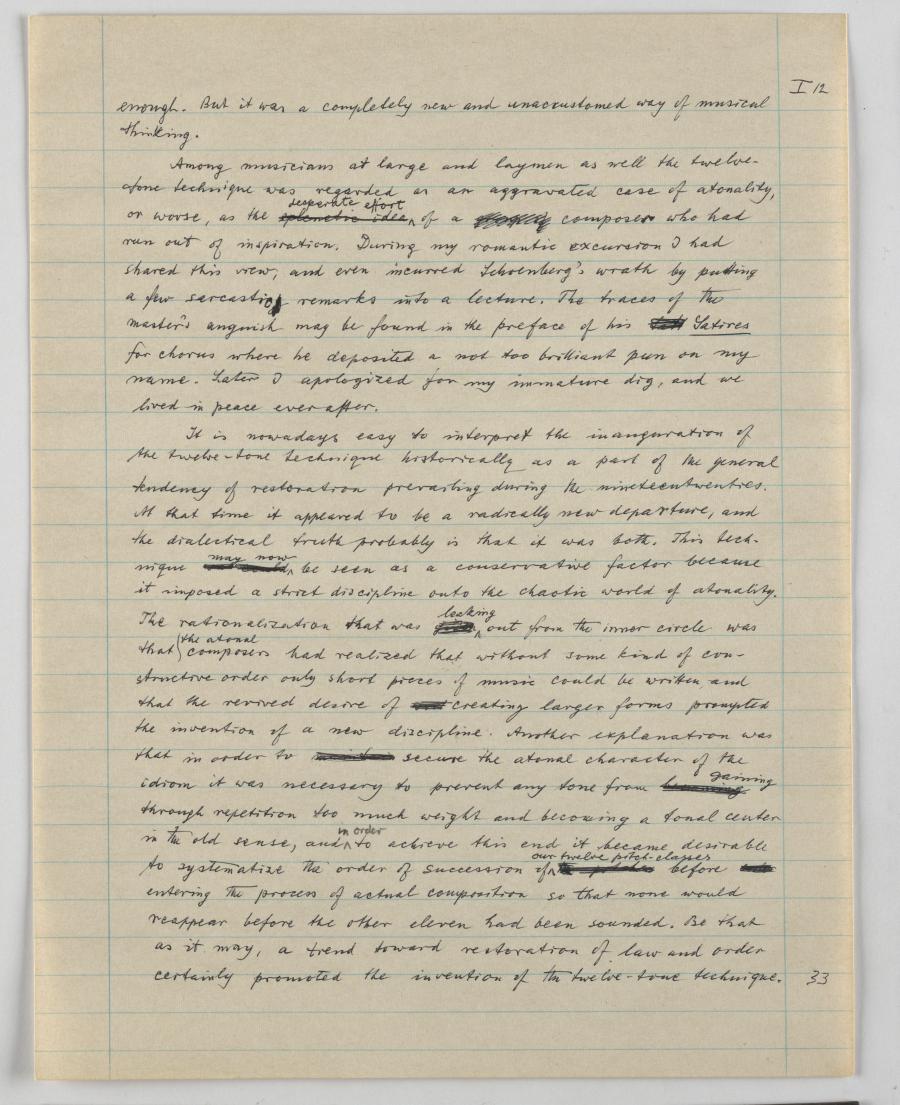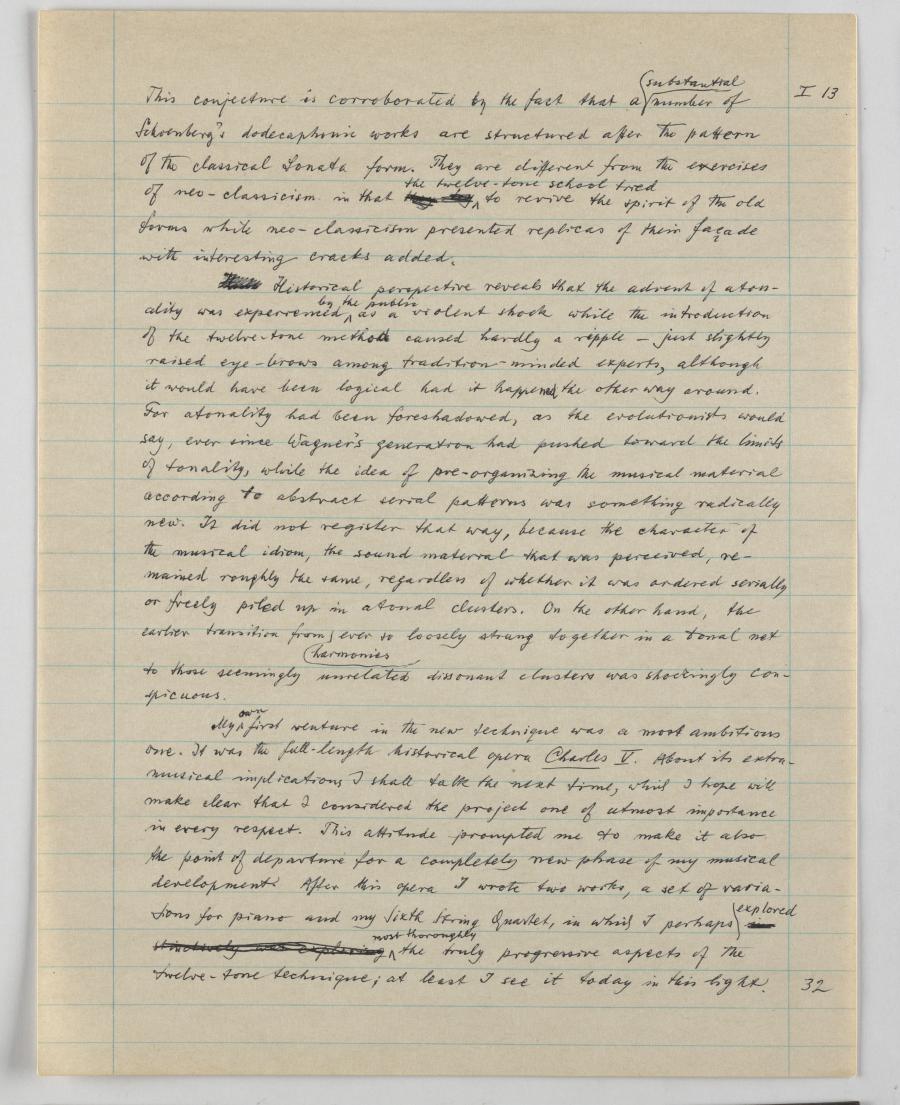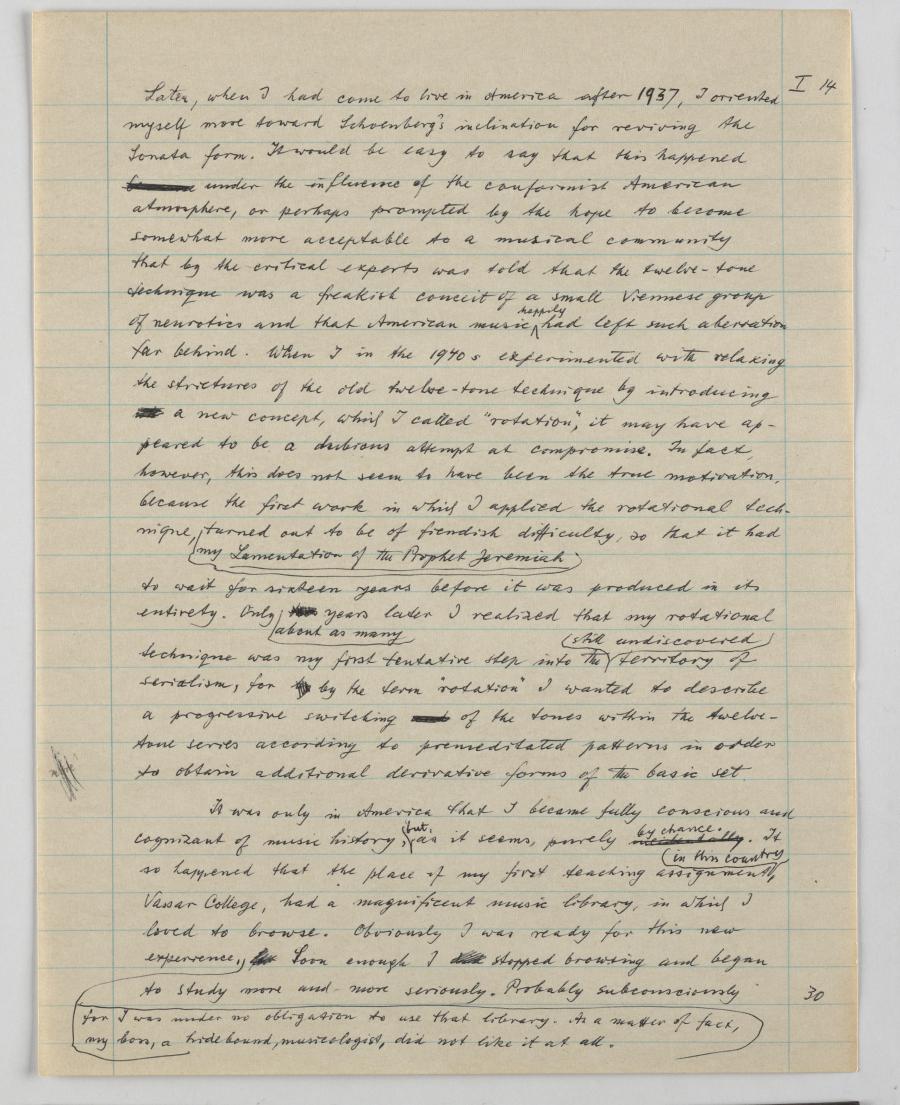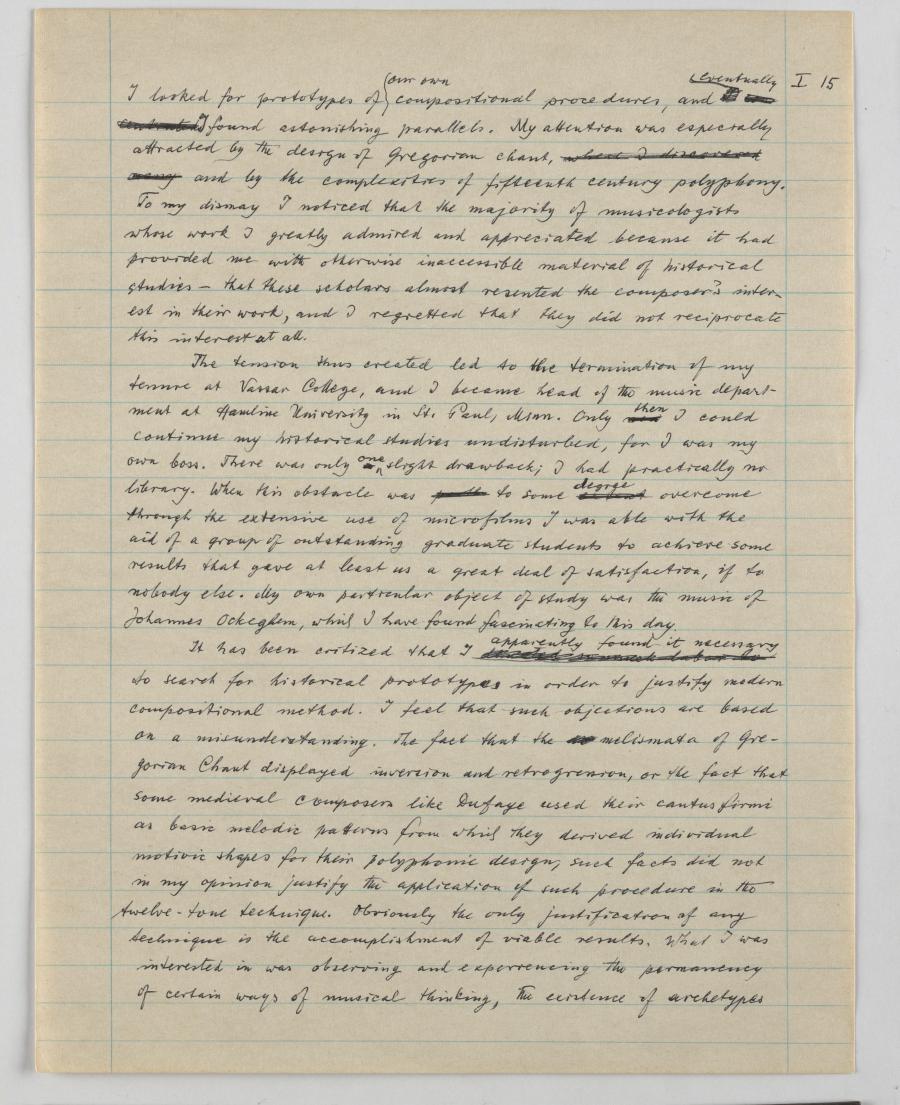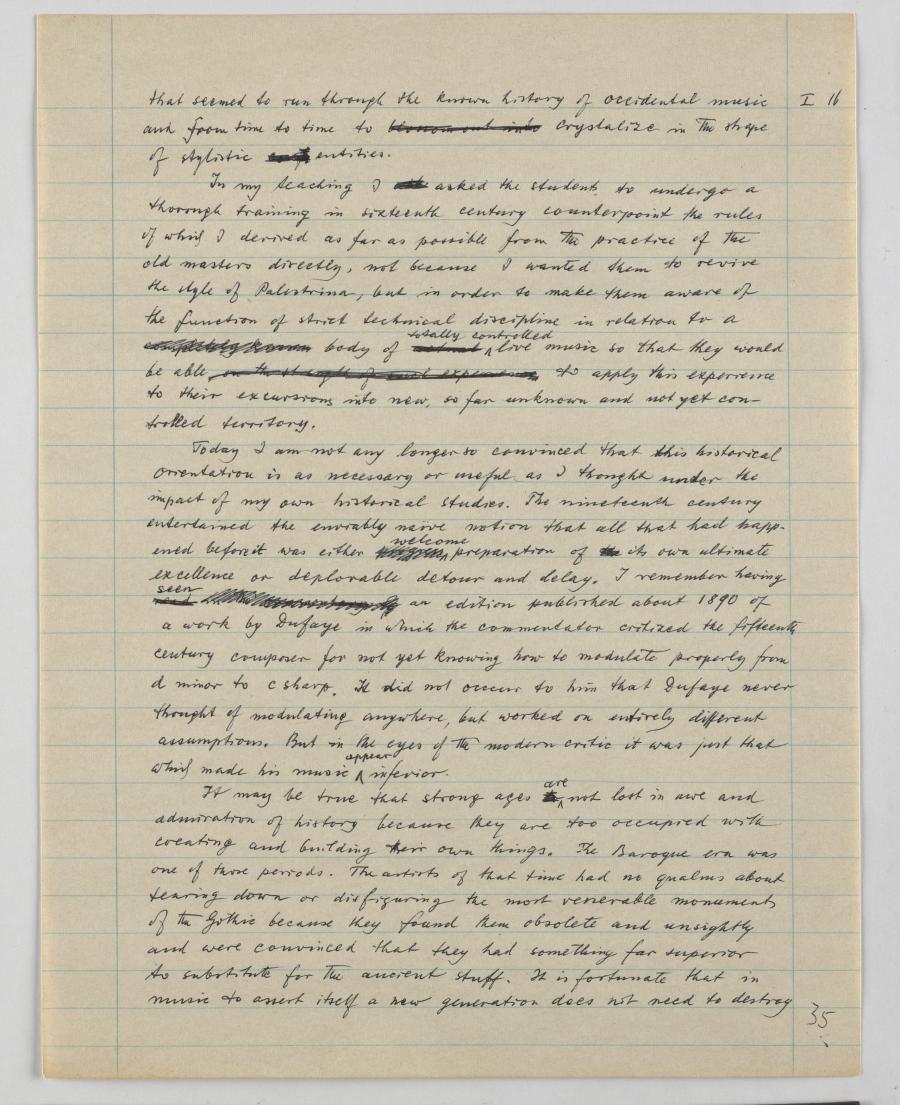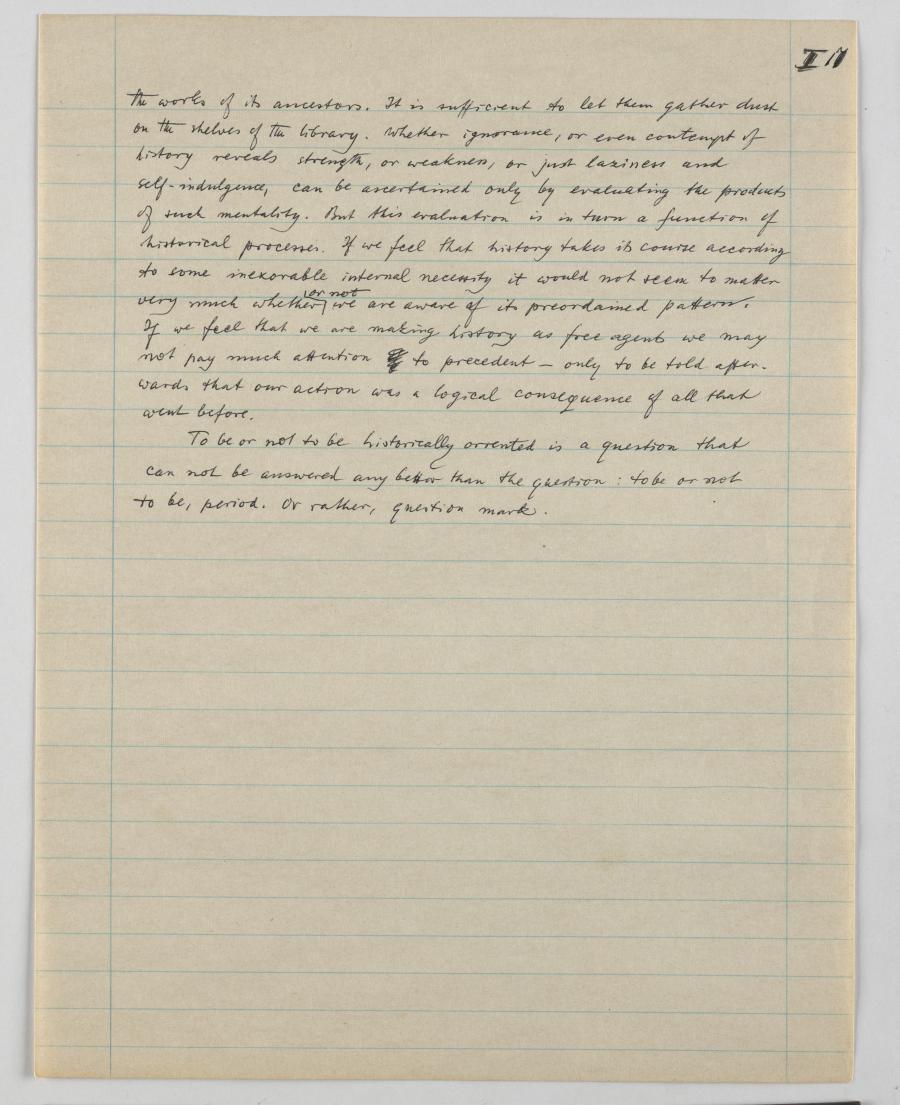A composer viewing this century's music. [UCSD Lecture I]
Abstract
Im Jänner und Februar 1970 war Ernst Krenek Regent’s Lecturer an der University of California, San Diego, wo er eine Serie von vier Vorträgen hielt unter dem übergeordneten Titel: „A Composer Viewing This Century’s Music“. Die Vorträge wurden jeweils Mittwoch abends gehalten und waren einer weit gespannten Themenpallette gewidmet.
In Krenek’s erstem Vortrag als Regent’s Lecturer an der UCSD, gehalten am 21. Jänner 1970, nimmt er in auto-biographischer Perspektive seine Entwicklung als Komponist in den Blick, wobei er die Stile seiner jeweiligen Schaffensperioden selbst in ihrer Beziehung zur historischen Entwicklung beziehungsweise zum selbstreflexiven Bewusstsein ihrer Historizität betrachtet.
Dazu gehört seine Phase des frei-atonalen Expressionismus, Neo-Klassizismus (insbesondere in Bezug auf seiner eigenen Schubert-Rezeption), seine Integration von Elementen der Unterhaltungsmusik in „ernste“ Musik, Annäherung Zwölftontechnik und seine Entwicklung darüber hinaus, in der er Inspiration von seiner Beschäftigung mit Musikgeschichte aufgenommen hat.
In these meetings I propose to sketch a panorama of our musical situation as observed through the windows of my personality and delineated by the positions that were as- signed to me in the changing scenes. Obviously the picture will be subjective, which I hope shall not impair is relative validity, especially since I will try to show that objectivity is intrinsically impossible, and where it is attempted, illusionary. It I thus limit the perspectives of my design to my own field of vision, I hope that this will not be interpreted as an expression of egotism, or vanity. Much as I have from time to time desired to occupy the vantage point of a de- tached observer who would faithfully register the sum total of the phenomena offered to his view, it was my fate to become always actively involved in the processes that would come under the consideration of comprehensive criticism. This my ruminations are inevitably conditioned by the changing positions of my creative personality. It would seem to me insincere if I should pretend that I am able to disregard these limitations, and therefore I have to accept them for better or worse.
My presentation will be articulated in four chapters.
The first, which is the subject matter of today's meeting, will
be concerned with the position in history of the contem-
porary problems of the society of which he is a member.
This subject matter I shall mainly illustrate by referring
to my operas (of which I have written twenty),
In the third session I should like to talk about the sociological and economic background of the composer's work as it has un- folded in our century. To conclude this series of informal communications I wish to focus the particular situation of composition at the present time, discussing the concept of serialism and investigating how it developed und what became of it. At the end of each session I shall play the tape recording of one of my works, such as would seem appro- priate to illustrate some of the points made.
To turn to the object of today's deliberation, which is
history and historical consciousness, let us consider first the
nature of history. It we define history as the sum total of things
past, we have to realize that it exists only to the extent of our
knowledge of it. We may experience the consequences of
something that has happened in the past, but this in itself
does not suffice to make us know that it happened, and
before somebody who
Insight of this kind became available to me only when
I immersed myself into the mysteries of con- Charles V.
as a composer, around 1920 when I had reached the same age
as our century, my historical consciousness was at a very
elementary level. In the composition classes of my teacher
The purpose of this training was to endow the students
with a sense of discipline and to make them aware of the im-
portance of technique, meaning that they should understand
that one can not rely on inspiration alone, but must also
While in the regimented field of strict counterpoint
every note was scrutinized for its correctness according to
the rules, in counter
The concept of progress, of course, implies some sort of
historical consciousness. It is based on the assumption that the
events of history follow each other as a chain of causes and ef-
fects
In terms of the musical situation in which I found myself as I
described it before progress meant that the musical idiom of had
In fact, the difference between the more moderate conventions
in which was to
When my teacher, to mevery little known and ratherdisposed
At that time I which that
My main interest was devoted to the form of the
Symphony, and in this I can see a certain symptom
of being conscious of historical continuity. I remember
that
decided to try to become the successor of many
A considerable number of modernistic compositions of mine originated in those years of the early twenties. In looking back at them I notice that their generally atonal idiom here and there includes isolated fragments of the language of tradition, usually evoking memories of a very early stage of the musical material, not yet touched by the late-romantic mannerisms of chromatics. Such en- capsulated remnants of another age evoke frequently a feeling of nostalgia and melancholy. The procedure as such is re- lated to the principles of surrealism, of which at that time I had not the slightest idea.
Elements of surrealism also characterized the move-
ment of neo classicism became of historyexpression musical design. Pulcinella, in which he transcribed, re-wrote and
remodeled materials fished out from the work of the early
eighteenth century Italian composer
.Pergolesi
This set the tone for most of the retrospective efforts to come.
The late seventeenth and eighteenth centuries were the primary targets
of the restaurative activities of neo-classicism. Of course the
reactionary aspect of this movement made it highly popular
with a public frightened by the progressive attitude of the
The situation was not really as simple as all that, for the
neo-classicists, especially by hininherit
Another ly
a little tired of the overheated emotionalism of the style and began
to dream of a cool, detached objective music that would rely
on perfect construction rather communication of
Personally I have not conscientiously or consistently
followed the line of neo-classicism. In Germany, under the in-
fluence of sociological considerations which I shall discuss
later, it took on a distinctly restaurative shape when com-
posers such as
I element
At that time in Central Europe very little was known
about American jazz which began to penetrate the con-
tinent only after the conclusion of World War I. The little
we knew about fitted in
clean, of
My own private was might complic more motivations.
My neo-romantic period lastet about five years. The main pro-
duct of my occasional preoccupation with jazz is the opera
Jonny spielt auf, which became so successful and famous that it
even infiltrated the Metropolitan Opera House in The bulk of
The opera Life of Orestes", which
I shall discuss the next time. Here the jazzy flavor permeates one
clearly defined sector of the stage action to create a sort of col-
loquial musical language, a musical
lingua
francaof our
an idealistic wish dream ofJonny spielt auf
For my
of musical expression, that is the atonal vocabulary, should not
made Urerlebnis has been. Some of the works that
originated in this frame of mind, especially groups and cycles of
songs, have retained a great deal of vitality. Nonetheless
I noticed that after a while I had run out
The alternative was between giving up composing entirely
(or at least for an indefinite period), or returning to modernism.
While I considered the former seriously and concentrated for
some time on literary work, the latter won out correct
enough. But it was a completely new and unaccustomed way of musical thinking.
Among musicians at large and laymen as well the twelve-
tone technique was regarded as an aggravated case of atonality,
or worse, as splenetic idea group of composerg remarks into a lecture. The traces of the
master's anguish may be found in the preface of his Satires
for chorus where he deposited a not too brilliant pun on my
name. Later I apologized for my immature dig, and we
lived in peace everafter.
It is nowadays easy to interpret the inauguration of
the twelve-tone technique historically as a part of the general
tendency of restoration prevailing during the nineteentwenties.
At that time it appeared to be a radically new departure, and
the dialectical truth probably is that it was both. This tech-
was could given becomming the pitches before
This conjecture is correborated by the they try
Charles V. About its extra-
musical implications I shall talk the next time, which I hope will
make clear that I considered the project one of utmost importance
in every respect. This attitude prompted me to make it also
the point of departure for a completely new phase of my musical
development. After this opera I wrote two works, a set of
Later, when I had come to live in turned out to be of years
It was only in incidentally for
I losked for prototypes I cen-
The tension thus created led to the termination of my
tenure at Vassar College, and I became head of the music depart-
ment at Hamline University in now a to some extent
It has been critized dewoted so much labor to
that seemed to run through the known history of occidental music
and from time to time to
In my teaching I
Today I am not any longer so convinced that this historical
orientation is as necessary or useful as I thought under the
impact of my own historical studies. The nineteenth century
entertained the enviably naive notion that all that had happ-
ened before it was progress theread in the commentary of an
It may be true that strong do
the works of its ancestors. It is sufficient to let them gather dust
on the shelves of the library. Whether ignorance, or even contempt of
history reveals strength, or weakness, or just laziness and
self indulgence, can be ascertained only by evaluating the products
of such mentality. But this evaluation is in turn a function of
historical processes. If we feel that history takes it course according
to some inexorable interal necessity it would not seem to matter
very much
To be or not to be historically oriented is a question that can not be answered any better than the question: to be or not to be, period. Or rather, question mark.
